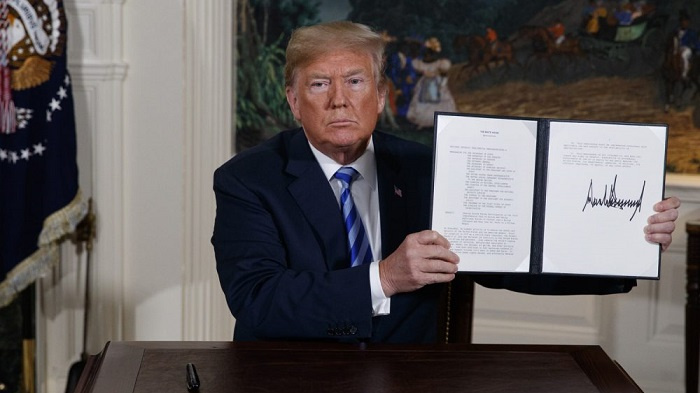Trump’s nuclear deal insult can be an opportunity for Iran’s economy

President Trump has violated the Joint Comprehensive Plan of Action (JCPOA) and withdrawn from a landmark security agreement that enjoyed broad international support. In his televised announcement on Tuesday, Trump clearly relished the opportunity to follow through on his campaign promise to “rip up” the Iran nuclear deal, declaring, “The United States no longer makes empty threats. When I make promises, I keep them.”
On one hand, Trump’s decisive and unexpected move to reimpose all primary and secondary sanctions lifted in 2015 as part of the nuclear deal represents a concerning development for Iran’s economy. On the other hand, Trump’s move may have created a significant opportunity. His rebuke of diplomacy and the broad reimposition of sanctions has angered European leaders. French Finance Minister Bruno Le Maire summed up the European sentiment in an interview with French radio: “The international reach of US sanctions makes the US the economic policeman of the planet and that is not acceptable.”
Since the enacting of the 1996 Iran and Libya Sanctions Act, the United States has had a disproportionate influence on the development of Iran’s economy. For political reasons, Europe had never fully challenged this extraterritorial power, and in the period of 2006-2015, European governments were willing partners for the United States’ economic warfare as they sought to isolate Iran for its nuclear program.
Today, attitudes have changed. The Trump administration is reimposing sanctions without political justification and without regard to Iran’s proven compliance with its JPCOA commitments. European governments are ready to resist this clear abuse of power. In light of this shift in attitudes, Iran must take advantage of European readiness to seriously discuss economic countermeasures by taking three concrete steps.
First, Iran must immediately establish a new “task force” with a specific mandate to develop economic countermeasures with European partners. This task force should join experts from the Ministry of Economic Affairs and Finance, the Ministry of Industry, Mine, and Trade, and the Central Bank of Iran into a single team led by the Ministry of Foreign Affairs. At the moment, these authorities are engaged in largely separate consultations with their European peers. But a proper exploration of economic countermeasures will involve discussions with European diplomatic corps, central banks, export credit agencies, sanctions authorities, and industrial entities in a set of all-encompassing deliberations. As such, Iran must reorganize its manpower to better engage in an effective dialogue with the full range of relevant European stakeholders.
Second, Iran must continue with its efforts to strengthen financial regulations and increase the transparency of its economy in accordance with the Financial Action Task Force (FATF) action plan. The FATF’s suspension of Iran’s position on the blacklist will expire in June. Even of greater concern, as part of Trump’s withdrawal from the nuclear deal, the Treasury Department will be relisting all Iranian companies removed from the Specially Designated Nationals (SDN) list as outlined in Attachments 2 and 3 of Annex II of the JCPOA. This move will impact all Iranian banks. Ensuring Iran’s financial sector remains in good standing with Europe will maximize the likelihood that Europe can devise protective measures to maintain financial linkages.
Third, Iran must find new ways to achieve economic growth until foreign direct investment can rebound. Cooperation with Europe to establish countermeasures to resist American pressure will begin immediately, but many of these solutions, such as the establishment of special investment vehicles, may take a considerable amount of time to become operational. Therefore, the Rouhani government must foster economic resilience and enable strategic patience. This can be best achieved by launching a new program of public investment in order to boost capital formation and create jobs. It is worth risking higher inflation rates in order to achieve higher growth, especially as interest rates will remain high anyway. Aside from the inflation risk, public investment in Iran remains very inefficient and this is part of the reason why the Rouhani government has been reluctant to use government budgets for development spending. However, European governments could be invited to provide technical assistance in these areas, helping Iran to devise investment schemes that achieve maximum economic growth for a minimum capital intensity, perhaps by prioritizing projects led by Iranian private sector actors or those involving European multinational companies.
For three decades the United States has imposed sanctions in order to isolate Iran. On May 9, 2018, Trump did something remarkable—he reimposed sanctions and isolated the United States. No doubt, these sanctions pose a real risk to Iran’s economy. But this is a risk that Europe is committed to mitigate in order to ensure that the Iranian people continue to receive the crucial economic benefits of the JCPOA. Iran must take advantage of the rift in the transatlantic relationship and cooperate with Europe to devise balanced countermeasures that protect channels for trade and investment. At this historic moment, it may be possible to take a major step to neutralize the unacceptable power of American politics over the Iranian economy.
* Esfandyar Batmanghelidj works on Iran business diplomacy through publishing, research, and events.
Source: Iran Daily

